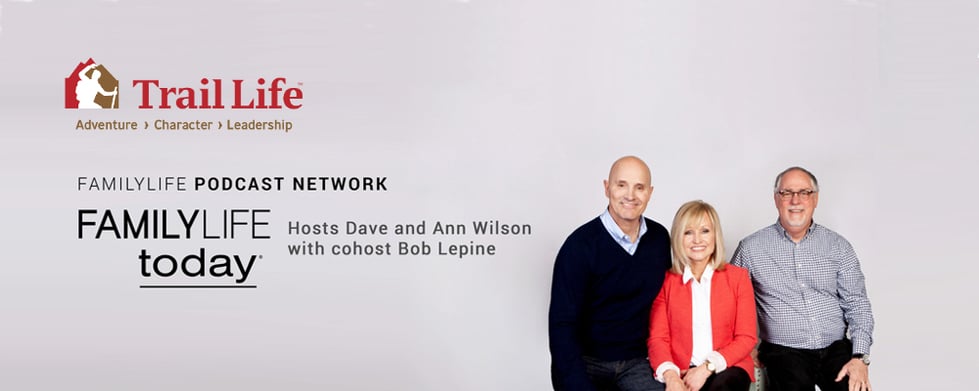Trail Life USA ® CEO Mark Hancock talks about the differences between boys and girls and the need to have boy-specific activities in scouting. Trail Life USA, he explains, is a boy-focused scouting organization that gives boys plenty of outdoor activities to challenge them and call out their inner competitor. Click below to download the podcast or read the transcript that follows.
Download Podcast
This is a two-part interview.
Don’t miss day one, where Mark discusses Raising Strong, Godly,
Courageous Men with the Family Life team.
Bob: I am an Eagle Scout. I grew up going to Scouts…Girl scouting and boy scouting are both very different today than they were when I was growing up. They’re dealing with all of this, and that’s why Boy Scouts are now boys and girls.
Ann: “Would your Boy Scout experience have been different had girls been involved?”
Bob: Of course, it would—
Dave: Yes.
“We know, intuitively, that boys and girls are different; and delivering the same program to boys and girls is not going to get the same results.”
Bob: —because getting together with boys and going camping, and going hiking, and doing, and learning—all of these things—yes; I would have acted different. I was taught to act different if—
Dave: Right.
Bob: —there are girls around. We wouldn’t have gone out and thrown the football around as much as we did, or we wouldn’t have gone out and wrestled like we wrestled when we were Boy Scouts. It would have been a different. You know who I should ask if I did right or wrong?—is the guy who heads Trail Life USA. [Laughter]
Dave: Hey, you know what? He’s sitting here.
Bob: He’s right here! Mark Hancock joins us, again, on FamilyLife Today. He’s kind of sad he did join
us on FamilyLife Today, at this point, I think. Mark, welcome back.
Mark: Hey, I think it’s okay to be here. [Laughter]
Bob: Yes; so you know the dilemma I’m talking about.
Mark: Yes; we hear about that a lot. It really is—Boy Scouts has an amazing legacy: presidents, and senators, and leaders, and civic leaders—
Bob: —radio hosts. [Laughter]
Mark: —astronauts, even radio hosts.
Ann: —famous ones. [Laughter]
“There’s something special that happens when we acknowledge: ‘Boys are boys, and girls are girls’.”
Mark: But they’ve decided, in the last few years, that that—whatever that secret sauce was is going to work for boys and girls. A lot of people are struggling like you are: “I’m not sure—I can’t quite identify what’s wrong with that except that I know that it just doesn’t sit right with me.” It’s because I think we know, intuitively, that boys and girls are different; and delivering the same program to boys and girls is not going to get the same results.
Bob: It’s not—I didn’t want to deprive these girls of anything. I’d love for them to go have a great week of camping, and I’d love for them to experience all that I experienced. You’re not trying to withhold anything; but you’re trying to say, “There’s something special that happens when we acknowledge: ‘Boys are boys, and girls are girls’.”
Dave: There is a unique thing that happens when boys can be boys/men can be men—women can be women—that you’re sort of tapping into. We are uniquely designed by God differently—not more important—just differently; so it requires a different strategy.
Talk about your three-part strategy to help boys be boys and, then, become men.
Mark: Well, we’re encouraging leaders of boys—whether it’s in Trail Life or in other organizations—to pay attention to the differences between boys and girls and create learning opportunities that are specifically tailored to them. We ask them to do first—is recognize that boys and girls are different.
There—it’s not a social construct; social construct does not change the structure of our eyes. Social construct does not account for the fact that girls/young girls can hear ten times better than young boys.
“You know, boys have a tendency to believe that they can do anything before they do it—they just think, “Oh, yes.” They see it, one time, on YouTube; and they’ve got it nailed. If we don’t give them the opportunity to try things and fail, then they develop this narcissistic approach to the world “
Well, in a classroom setting, what do you think that’s going to look like? It’s going to look like boys aren’t paying attention; and they must be ADHD, or they must be rebellious, or whatever: “We’ll have to punish them or tell them to pay attention”; but it’s just a biological truth; it’s not a social construct. They don’t learn to
shut down their hearing; they don’t learn to be able to see things that are far away and moving much more easily than they see something up close—they are built that way.
Bob: Acknowledging that boys and girls are different, you say that: “With that acknowledgment, here are some things that parents need to be doing…” “…that teachers need to be doing,” “…that leaders need to be doing as they raise boys. Use plenty of volume.”
Mark: Yes.
Bob: You also emphasize the need for risk and competition. If you’ve got 30 kids competing/30 boys competing in something, and one is going to win; what do we call the other 29?
Mark: Second
place. [Laughter]
Ann: Losers.
Bob: Losers.
Ann: Yes!
Bob: So, you understand where moms and dads or teachers go, “We don’t want to have 29 losers and one winner.”
Ann: “I don’t want my child to feel bad about themselves,” and “We’re fearful—
Bob: —“to think of themselves as a loser.”
“One of the things we did, as parents, is—we got them involved in different sports—not because that was going to be their thing—but because of the risk, because of the adventure, because of the competition,—one of the best things about that is they lost. “
Mark: At the same time, we need that experience. We need to know that there are things that we are good at, and there are things that we are not as good as somebody else at. We don’t have a level playing field; that isn’t real life, at all. If boys can learn that there are things that they excel at; then, they can learn: “Well, that’s not my thing. That’s okay.”
You know, boys have a tendency to believe that they can do anything before they do it—they just think, “Oh, yes.” They see it, one time, on YouTube; and they’ve got it nailed. If we don’t give them the opportunity to try things and fail, then they develop this narcissistic approach to the world: “Oh, I can do that”; but they don’t. They
don’t step out and do it. They just—in their mind, they’ve already assumed that they can; so we encourage risk and competition.
We tell the leaders: “Mix it up some. If you’re concerned about a boy losing all the time, mix it up. Let them do teams. Move it around so he’s on a winning team every once in a while. Give him the experience of winning, and succeeding, and doing well; and give him the experience of losing and ‘Life doesn’t end.’”
Dave: I know that with our boys, as you watch them to see what they are good at and they are gifted at, you could see they weren’t all going to be athletes—pro-athletes/college athletes—you name it. One of the things we did, as parents, is—we got them involved in different sports—not because that was going to be their thing—but because of the risk, because of the adventure, because of the competition, because of the interaction with other boys. It was really something you look back on—they learn—one of the best things about that is they lost.
Mark: That’s where character is built, in those kind of situations, where you find out: “Oh, I thought I could do everything. I found out that I’ve got to humble myself a little bit. Maybe, there are some things that I can’t do that I’m going to have to work harder at,” “…that I’m going to have to practice or study for/I’m going to have to work for. I’m not going to be handed it.” That’s a great place to learn—losing is a wonderful place to learn.
Dave: Now, when can competition be bad?
Mark: Well, you have to follow three rules for boys. You have to give them a secure sense of who is in charge. They have to know who is with them/who is on their team. They have to know what their mission is. If you’ve got a person, who is clearly in charge—in a Trail Life situation, that’s going to be a child safety/youth protection, background-checked adult, who is watching that room—they are setting the rules. Boys want rules; they are going to test rules.
“Losing is a wonderful place to learn.”
You see, when the substitute teacher walks in the room and says, “Well, I’m your substitute today,” the girls say: “Okay; I get this. I understand you’re in charge.” Well, boys want to know/they want to test that person a little bit because they have to know: “Are you really in charge? I’m going to push that boundary a little. I’m going to find out if you are really going to…” What it really comes down to is: “Am I safe?”
“Is somebody answering that ‘Who is in charge?’ question? I need to know because I know these other boys in my classroom. If you can’t handle this, Mr. Substitute Teacher, you don’t know what can happen in here.” They are pushing that; they are trying to establish the boundaries, because they want to know if somebody is solidly in charge. So, you’re trusting that, in that sense—doing that kind of read that you’re talking about—there is an adult there who has an adult perspective/frontal lobe fully-developed, who can say: “That’s dangerous,” “That isn’t.”
Dave: Your third strategy has to do with physical movement. Talk about that.
Mark: Yes; we’ve hit on some of that. Boys have to move in order to be engaged. They have to have breaks. In our culture, we are removing recess. We have completely removed recess in many cases; and we expect those boys to just sit in that classroom and sit still, be quiet, pay attention for the entire school day. Any psychiatrist/any physiologist will tell you: “He’s got to have motion. We’ve got to keep those boys moving.”
Bob: I’m thinking about the parents, whose sons are coming home from school, throwing down their books, grabbing their PlayStation controls—and for the next half-hour to, maybe, six hours—the kids are sitting there, glued to watching somebody on a screen run around, even though they are not running around. You’re saying a mom or a dad needs to say: “Hang on; time out. Turn off the set. Go out in the backyard; run around.”
“Boys have to move in order to be engaged. They have to have breaks.”
Mark: Absolutely; they need to have that physical break. Now, they are trying to solve their issue there about risk and competition—they are entering that video-game world in order to have that opportunity—but you’ve got to give them that physical break also.
Dave: Oh,
I can remember our boys coming home from school—Ann remembers this—and it’s almost dinnertime or almost bedtime, and they are so wound up. They’re never going to settle down, just driving us crazy. I would go: “Alright; line up. Let’s go. We’re doing 100-yard sprints for the next 20 minutes.” We would just run.
Ann: —in the snow, mind you, because in—
Dave: —just to get it out of them—
Ann: Yes.
Dave: —so they would actually settle down and go to bed; it actually worked. That’s the physical movement, and risk, and competition.
Ann: But it’s really because, as moms, we think, “Oh, I don’t want to do this,”—we’re tired. Dads think the same thing, especially after work. We’re all exhausted; but our kids need us to engage with them. Sometimes, that looks -physically, we’re engaging in pulling that out of them.
“Boys need to have that physical break. [With video games] they are trying to fill their need for risk and competition—they are entering that video-game world in order to have that opportunity—but you’ve got to give them that physical break also. “
Mark: Let me address that real quick; because there’s the single mom out there, who doesn’t have the dad, who is coming home and taking them all outside. There’s a single mom, who may not have the physical abilities, or desire, or time to do what it is that you were able to do; and that’s just such a tragedy.
They did a study on the Head Start Program. The number one thing that they found that—the predictor of
success for Head Start was: “Is there a dad in the household?” It’s because you’ve got that dad, who walks in the door—Dave, like you did a hundred times, or a thousand times, or a million times—and the boys are sitting there,
quietly, because mom’s got them quiet. You come in, and you throw one to the floor—
Ann: Yes!
Mark: —and kick them, and throw them, or whatever; and then you go to the bedroom to go shower, or whatever, and get ready for dinner. They are all fired up now, but they learn to bring it back down again. They have that opportunity of getting fired up and bring it down—fire up and bring it down. Well, boys, without that
experience—they don’t know how to turn that knob back down again. They show up at school and think something exciting happens, and they just can’t get back into place.
I would encourage men, who are listening: “If you don’t have a son at home, there is a boy somewhere that needs your influence in his life. Reach out to the boy.” Again, you’re not his father; but you can be father-like, and you can provide that thing for him that he so desperately needs—a tussling of the hair, a little punch of the arm—just some sort of physical connection. That’s going to give that boy what he just isn’t getting at home, because his mom—as wonderful as that single mom is and the struggles that those single moms have—there is just that piece that boys need that they can only get from their dads. They are desperate for that touch.
Dave: You know what is interesting?—is I was that boy—single mom.
“I would encourage men, who are listening: “If you don’t have a son at home, there is a boy somewhere that needs your influence in his life. Reach out to the boy.” Again, you’re not his father; but you can be father-like, and you can provide that thing for him that he so desperately needs.”
Mark: Yes.
Dave: I can remember—now, I appreciate it—her grabbing the ball gloves. I’m eight, nine, ten—saying, “Let’s go out in the back and play catch.” My mom who, now, I know—it’s like the last thing she wanted to do. I do remember I was twelve; she would get down—in catcher stance, catcher’s mask on—
Bob: Wow.
Dave: —and I remember—twelve—I was throwing pitches. She just walked up; she goes: “Okay; I’m done. I can’t handle your fastball anymore.” [Laughter] But she also got me involved in Boy Scouts/Webelos—
Bob: Yes.
Dave: —Big Brother.
I had a big brother, who—she just knew there had to be other men in her life. She did both—she was the one that said: “My son needs activity; he needs risk and competition. I can provide some of that, but I also need somebody to come alongside me.”
I’d say to all the single moms: “You can do it, and get help. There are people who can help you. Trail Life is a great ministry to come alongside you.”
Bob: In fact, we’ve information about Trail Life on our website at FamilyLifeToday.com. Tell everybody about the event you’ve got coming up in July.
Mark: July 21-27 in Toccoa, Georgia, is our Summer Adventure and Family Convention with Dennis Rainey.
Bob: Yes! Dennis is going to be speaking at that. This is for families to come together. The boys can get involved in Trail Life activities. Mom and Dad can stay in the hotel if they want to stay in the hotel; or if Dad wants to go out and camp with the boys, he can do that; right?
Mark: Absolutely.
Bob: You’ve got a program going on for both during the week that they’re in Georgia. Again, there is more information about the event on our website at FamilyLifeToday.com.
Mark, thanks for helping us just think clearly about how we can help our boys be boys.
Mark: Well, thank you. It’s been a pleasure.
Bob: I’m hoping that a lot of our listeners will go to FamilyLifeToday.com, not only to find out about the Rise Up event, but we’ve got a copy of a booklet that you’ve written called “Let Boys Be Boys” that is available for free download. Again, go to FamilyLifeToday.com; and you can download Mark’s booklet. Click on the link and find out more about Trail Life. Again, the website is FamilyLifeToday.com.
Talking today about investing in the lives of young men, David Robbins, the President of FamilyLife®, is
here with us. You heard a great story this week about guys who invested over a period of time in younger men; right?
David: I was in small group, and one of the other dads in my small group is a high school principal at a local high school here. He was talking about these two dads—who, starting in sixth grade, weekly, would meet with this group of guys/with their sons and some of their friends. They’ve done that over the last six years. Sure enough, these kids just graduated. He was just making this remark of how their character just shines—in the way they treat people, and their love for Jesus, and authenticity and the way they push each other in accountability
and in relationships.
He actually brought those dads into his office and was just taking all these notes—was showing me these
notes. Then, he said one of the dad’s names. I go, “Oh my goodness; is his son named Ben?” He goes, “Well, yes; Ben’s his oldest son.” I go: “Ben is a guy, who is investing in a group of seventh graders, every other Wednesday night. My son—my oldest son is one of them.”
It was just this amazing moment of realizing, not only are these seniors shaped as they get launched
into college and beginning their adulting years—the intentionality of investing in young men, not only shapes them in the current, but it also shapes how they end up investing their lives later.
Bob: Second Timothy 2:2 at work right here; right?
David: That’s right.
Bob: “That which you have heard from me you pass on to faithful men who will share it with
others.”
David: That’s right.
Bob: Thank you, David.










